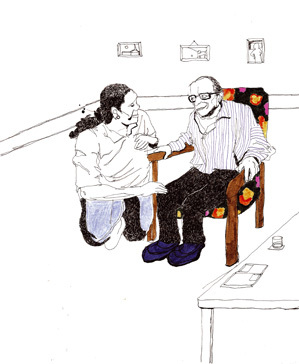Dark age
As the number of people with dementia rises sharply, Kath Grant finds that the need for a national strategy has never been more pressing.
The biggest myth about dementia is the widespread perception that it’s a case of ‘them’ and ‘us’, believes Victoria Metcalfe.
As dementia specialist team manager for Anchor Trust, Ms Metcalfe knows that many of ‘us’ will develop dementia as we grow older. Because of the UK’s ageing population, the number affected is set to soar – last year, an Alzheimer’s Society report warned that the number of people with dementia will rise rapidly, from 700,000 to 1 million in less than 20 years.
This is a conservative figure because many people with dementia remain undiagnosed. Research shows that, on average, people wait three years after the onset of their symptoms before seeking help.
The Dementia UK report, prepared for the Alzheimer’s Society by the London School of Economics and King’s College London, also revealed that dementia currently costs the UK £17 billion a year and said urgent action was needed to plan for the escalation in dementia over the next two decades.
At the launch of the report Neil Hunt, chief executive of the Alzheimer’s Society, called for a national dementia strategy. ‘We need to tackle this huge challenge head-on. Planning now will save lives and money in the future.’
The government appears to have taken heed and is consulting on its draft national dementia strategy – the first of its kind. It is due to be published in the autumn. Welcoming the government’s plans, Mr Hunt said it was ‘time to drag dementia out of the dark ages and change the way we treat some of our most vulnerable older people’.
Many housing organisations are already responding to the challenge and are grappling with the implications of the rise in dementia in their area of the country.
‘Raising awareness about dementia is vital,’ says Ms Metcalfe, who is also a trainer with the Alzheimer’s Society. ‘We should treat people as individuals: no two people with dementia are the same. We can only provide the best care and support when we have focused on each person and discovered what is best for them.’
Expert help
A recommendation in the government’s draft strategy highlighted the need for informed and effective workforces to care for people with dementia. Anchor’s specialist teamwas specifically set up in response to the increased number of people with dementia who are either living in the trust’s homes or accessing its services.
Team members are located throughout the country and each member has their own area of expertise, including communication techniques, understanding behaviour, food and nutrition, and design and environment.
‘We promote person-centred care in order to make the experience of dementia less distressing,’ Ms Metcalfe explains.
Already, the team’s advice and support to frontline staff at Anchor has helped residents with dementia stay in their own homes rather than go into a nursing or care home.
‘Sometimes it can be quite a simple thing,’ says Ms Metcalfe. ‘One worker noticed that a resident became very distressed when his yellow sheets were changed for white ones. He was using the yellow sheets as a way of identifying his own bed.
‘People with dementia can sometimes disturb other residents when they start walking around or banging on doors, but if their own door is clearly identified with a sign which is unique to them they will usually become calmer as a result.’
The specialist team is in the process of providing dementia awareness training for all Anchor staff, with more detailed courses available for those working on the frontline.
‘The range of services offered by Anchor – nursing and care homes, supported and sheltered housing – means that we can cater for people with different levels of dementia. We try to encourage people to live independently but there will come a time when intervention is necessary and part of the team’s role is to educate staff so that they know when it’s time to step in.’
Allowing people to stay in their own home for as long as possible is a key part of good dementia care. Housing 21 has recently secured money from the King’s Fund to pay for a specialist community-based end-of-life nurse.
David Williams, head of dementia services at Housing 21, says: ‘If we had a choice, most of us would prefer to die at home. This is especially the case with people with dementia because they can become very distressed if they are removed from their usual surroundings.’
Springboard Housing Association, part of Genesis Housing Group, is working in partnership with local community services to help residents with dementia sustain their tenancies.
Supported housing manager Maggie Duffy says housing associations can take a major step towards supporting customers with dementia by looking at their services, finding out what resources are available in the community and working with partners to fill the gaps.
‘Housing customers with dementia can be demanding but also very rewarding. With the right staff team and the right training, there is no reason why people cannot continue to live in a supported housing environment,’ she adds.
Dementia: the facts
- The term dementia describes a group of symptoms caused by the impact of disease on the brain. It is a progressive decline in the ability to remember, learn, understand, communicate and reason.
- There are currently 700,000 people with dementia in the UK.
- There are currently 15,000 younger people with dementia in the UK.
- There are more than 11,500 people with dementia from black and minority ethnic groups in the UK.
- There will be more than a million people with dementia by 2025.
- Two-thirds of people with dementia are women.
- The proportion of people with dementia doubles for every five-year age group increase.
- One-third of people over 95 have dementia
- 60,000 deaths a year are directly attributable to dementia.
- Delaying the onset of dementia by 5 years would reduce deaths by 30,000 a year.
- The financial cost of dementia to the UK is more than £17 billion a year.
- Family carers of people with dementia save the UK more than £6 billion a year
- 64 per cent of people living in care homes have a form of dementia.
- Two-thirds of people with dementia live in the community, while one-third live in a care home.
Come together: the role of dementia cafés
Dementia cafés are not just about tea and coffee. They supply a meeting place for people with dementia and are a crucial support network for home carers, who can meet both professionals and other carers at the monthly or weekly get-togethers.
The cafés have been opening in towns and cities throughout the UK for the last eight years, but the idea was pioneered in Holland in 1997.
Springboard Housing Association is working with other partners, including the Alzheimer’s Society, to establish a dementia café in Newham, east London.
‘The idea is to get professionals to sign up and come along once a month to talk to people with dementia and their carers about any worries or queries they have,’ says Maggie Duffy, supported housing manager at Springboard.
‘We want social workers, GPs, district nurses, chiropodists and opticians to come to the cafés. It would be a place where people could have their hair done and their eyes tested for glasses.
‘It would also be an opportunity for carers to speak with professionals and to mix socially with other carers. We hope it will take some of the pressure off people who have dementia and their carers,’ she says.
There is now also a dementia café website with facts and information about dementia, as well as a carers’ chatroom. This means that, as long as they can get online, carers have access to advice and support at any time of day or night.
www.dementiacafe.com
In good voice
Housing 21’s Dementia Voice is the only specialist dementia centre of excellence in the housing sector.
Housing 21 actively seeks funding for new research and has just received support for an innovative computer skills project for people with dementia. Research projects like this can provide mental stimulation and activity – and may help slow cognitive decline.
Other initiatives for people with dementia include:
- Cognitive Stimulative Treatment. A brief but effective treatment for people with mild to moderate dementia. The basic treatment involves 14 sessions of themed activities over a seven-week period aimed at stimulating and engaging people participants.
- Music for Life. Music improvisation workshops are being used as a way for older people with dementia to communicate and regain autonomy and self-esteem. The workshops foster a sense of bonding and community spirit among participants and give those less able to join in fully with group activities the opportunity to lead in music improvisation.
- Home Care Plus. One-to-one person-centred support and care, ensuring people with dementia can stay at home. Clients are helped to pursue leisure and cultural interests. Support includes escorting clients to health appointments and visits to friends and family. Home Care Plus can also continue regular visits when someone is in hospital or respite care.








